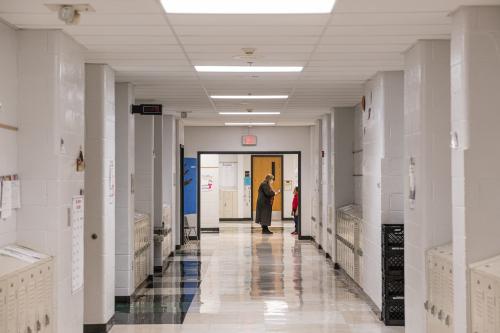Studies in this week’s Hutchins Roundup find that assisting firms directly during pandemics is more stimulative than assisting banks, the erosion of employment protections may be driving the rise in the college premium, and more.
Want to receive the Hutchins Roundup as an email? Sign up here to get it in your inbox every Thursday.
During a pandemic, assisting firms directly is more stimulative than assisting banks
The Fed responded swiftly to the COVID-19 pandemic, reviving old programs and establishing new ones. Using a standard macroeconomic model, Eric Sims and Jing Cynthia Wu of the University of Notre Dame argue that new programs—lending directly to non-financial firms—will be more stimulative than traditional QE—lending to financial firms and asset purchases. Traditional QE helps relieve financial firms’ balance sheet constraints, which allows them to lend to the real economy. But this will be ineffective in the current crisis because, even with balance sheet space, banks remain unwilling to finance firms whose cash flows are hampered by the pandemic. In contrast, by lending directly to firms, the Fed can alleviate cash flow constraints that firms are facing and trigger an increase in investment. The policies become perfect substitutes when banks’ balance sheets are impaired, such as during the Great Recession, and implementing either will stimulate the economy. The authors conclude that central banks lending freely isn’t enough to combat an economic crisis; they must lend to where constraints are most binding.
Lack of employment protections may account for the rapid rise in the college premium in the US
Despite similar levels of skill-biased technological change and increases in the supply of college-educated workers, the wage premium that college graduates earn in Germany has remained relatively flat since the 1980s while it has risen rapidly in the US Matthias Doepke from Northwestern University and Ruben Gaetani from the University of Toronto argue that Germany’s stronger employment protections can explain about half of the difference in these trends. Increasing economic turbulence over time has eroded US firms’ and employees’ expectations of a long-lived relationship while German employment protections have insulated the economy from similar erosion, particularly for less educated workers. Consequently, the incentives for less-educated workers and their employers to invest in firm-specific skills has fallen in the US but not in Germany, leading to a slowdown in wage growth for workers without a college degree in the US, and, consequently, an increase in the college premium
Job counseling for young unemployment insurance recipients pays off
Marios Michaelides from the University of Cyprus, Peter R. Mueser from the University of Missouri, and Jeffrey A. Smith from the University of Wisconsin evaluate four experiments after the Great Recession aimed at helping young recipients of unemployment benefits find jobs—two in Florida, one in Idaho and one in Nevada. UI recipients under age 25 were randomly assigned in 2009 to a treatment group which got extra attention and a control group which did not. In all four experiments, the duration of unemployment benefits and the total amount paid were lower in the treatment group. The Florida and Idaho programs emphasized orientation meetings and referrals to job search assistance; the hassle mainly induced participants to stop collecting benefits as opposed to finding work. In contrast, the Nevada program—which combined mandatory job-search counseling with monitoring—caused the largest reduction in UI receipts and clearly increased employment and earnings. The authors reason that since young recipients have limited experience with the job-search process, the information that job counseling programs provide may be particularly valuable for youths.
Chart of the week:
Quote of the week:
“By the end of 2020, 170 countries—almost 90 percent of the world—will be worse off with lower per capita income[…] Never in our history have we seen such a tremendous reversal of fortunes for so many. And we have never had such a truly global crisis as the one we face now[…] The process of reopening is now starting across the globe—some 75 percent of countries are now reopening—and so now is the moment to think carefully about what comes next. We must choose what kind of recovery we want. There are those who talk about building back better. But I believe we should think about building forward—not back—and building a recovery that is focused on a great transformation as we emerge from this exceptional crisis,” says Kristalina Georgieva, Managing Director of the International Monetary Fund.
The Brookings Institution is committed to quality, independence, and impact.
We are supported by a diverse array of funders. In line with our values and policies, each Brookings publication represents the sole views of its author(s).












Commentary
Hutchins Roundup: Quantitative easing, college wage premium, and more
June 11, 2020